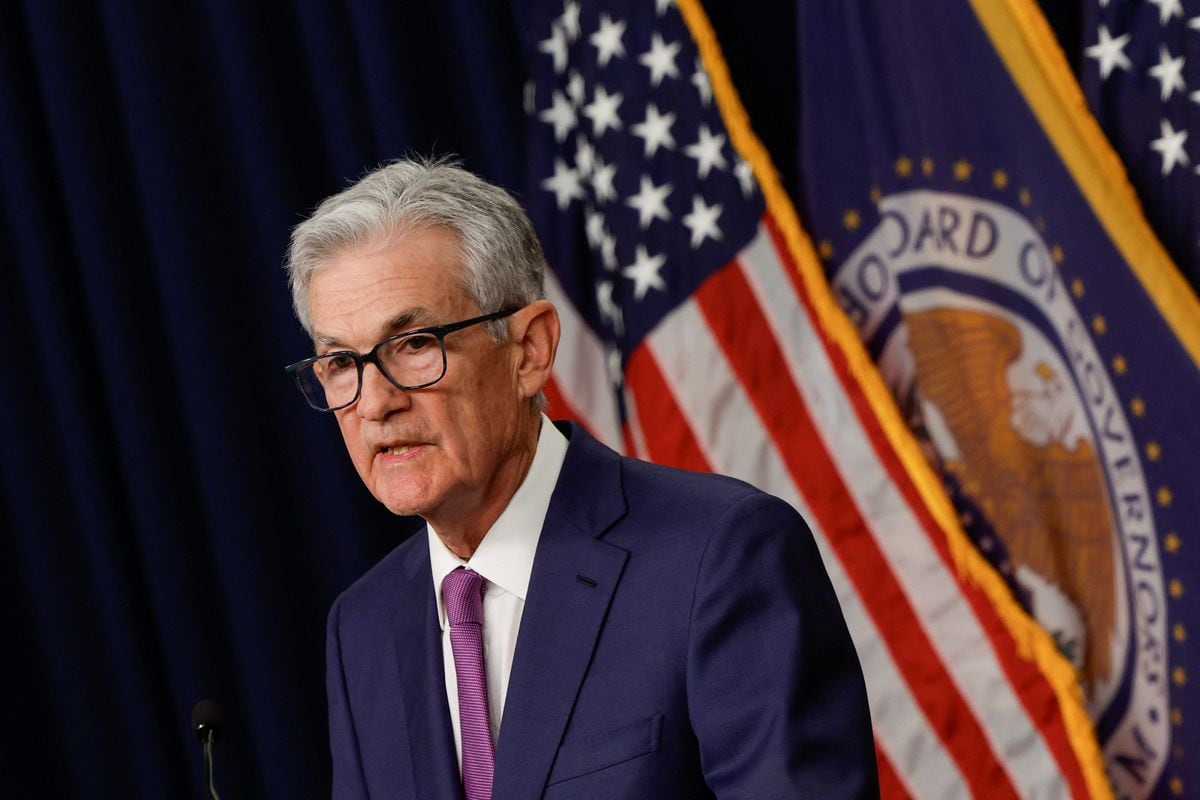Icon: enlarge
Headquarters of the European Central Bank (ECB) in Frankfurt am Main
Photo:
Frank Rumpenhorst / dpa
Habituation is an enticing state of mind.
Somehow it will go on as usual.
Why get excited?
We like to be lulled by the status quo until we wake up to a different reality.
In the past week, disturbing numbers came to the public.
The Institute of International Finance (IIF) reported an "attack by the debt tsunami": the world's total liabilities currently amount to more than 270 trillion (!) US dollars.
Countries, companies, banks and private citizens combined have accumulated debts that are more than three and a half times the annual output of the global economy.
The problem is not just the level of debt, but also the dynamics: In the first three quarters of this year alone, gross economic debt rose by 15 trillion US dollars, according to IIF calculations.
To the author
Photo:
Institute for Journalism, TU Dortmund
Henrik Müller
is professor for economic journalism at the Technical University of Dortmund.
Before that, the graduate economist worked as deputy editor-in-chief of manager magazin.
In addition, Müller is the author of numerous books on economic and monetary issues.
Every week he gives a pointed outlook on the most important economic events of the week for SPIEGEL.
The trigger for the drastic increase in the course of this year is the Corona crisis.
The states are doing everything possible to cushion the slump in economic output through shutdowns and lockdowns.
Corporations have soaked themselves in debt in order to stay fluid as revenues plummet.
Private citizens try to maintain their standard of living halfway in the worst economic crisis for generations.
All of this comes on top of debt levels that were high before the pandemic broke out.
Now one could dismiss the numbers as scaremongering a lobby organization.
The IIF is an association of large financial companies;
the current Chairman is Axel Weber, Chairman of the Board of Directors of the Swiss UBS and formerly President of the Deutsche Bundesbank.
However, the IIF figures match the findings of other institutions.
The International Monetary Fund (IMF) recently calculated that state debts alone have reached record levels in relation to economic output: The West, taken together, is as deeply in the chalk in relation to economic output as it was at the end of World War II.
In the emerging and developing countries, the values are higher than ever before.
The vulnerability of the global financial system is currently "high and increasing".
Statistics from the Bank for International Settlements (BIS) show similar trends.
It is not that normalization is in sight anytime soon.
If one continues the previous trends, the IIF expects a further increase in the global total debt by the end of the decade - to then 360 trillion dollars.
Can that go well?
Bankruptcies, bad luck and Erdoğan
Emerging and developing countries are initially affected.
The rating agency Fitch now considers 38 countries to be so financially weak that they run the risk of no longer being able to service their national debts.
Some are already bankrupt: Last week, Zambia temporarily suspended its interest payments on some dollar bonds.
The copper producer had benefited from high raw material prices for years.
International investors, looking for positive returns in the face of measly interest rates in the West, were happy to lend money to the African state.
Then the copper price collapsed - and with it government revenues.
The situation is made more difficult in many places by the fact that emerging and developing countries have borrowed a large part of their borrowing in dollars, some in euros.
That was an advantage for them because of the low interest rates in the west.
And as long as the valuations of their currencies were high and their solvency seemed secure, some wishes could be fulfilled by financing in hard currency.
The corona crisis has now caught them off guard.
Revenues are falling, spending on health and social affairs is rising, and currencies are devaluing.
Zambia's kwacha has fallen a third against the dollar since the beginning of the year.
From the Zambian point of view, debt servicing is correspondingly expensive.
Turkey, heavily indebted in foreign currency, is currently trying to stop the decline of the lira with drastic measures.
President Recep Tayyip Erdoğan removed his son-in-law from the post of finance minister and appointed a new head of the central bank, who raised key interest rates to almost 15 percent last week.
Since the Turkish state as well as companies and banks are largely indebted in dollars and euros, the rapid devaluation of the currency hurts twice.
Argentina hit it earlier this year.
International creditors accepted, for better or worse, that the South American state would only repay 55 percent of outstanding bonds.
What if interest rates go up?
Things are different in the West, and so is China.
The debts of governments and companies are much higher than in poorer economies.
But most of them are denominated in local currency.
In the end, this is of no use to many companies if over-indebtedness approaches as business collapses.
But at least wildly fluctuating exchange rates do not threaten their solvency.
In addition, the central banks intervene massively in the markets and keep interest rates low.
Since February, the Bank of Japan has bought 75 percent of newly issued debt securities, the European Central Bank (ECB) 71 percent, and the US Federal Reserve 57 percent, according to the IMF.
This means that state bankruptcies in the West are initially ruled out.
Nevertheless, the question arises as to how far the debt can still be inflated - or whether it will eventually become tight.
After all, it is possible that interest rates won't stay as low as they are now forever.
This is particularly supported by demography.
In the past decades the great vintages of the post-war generations saved for their old age.
This investor money ensured a massive expansion of the international capital supply.
Experience has shown that if these age groups gradually retire, they will want to save less and consume some of their wealth.
The supply of capital would decrease, the price for capital - the interest - would rise again.
This scarcity effect could be considerable, given that demographic trends are similar in the large western economies.
These considerations speak in favor of not driving up debt levels unrestrainedly.
Financial oppression
The United States and Great Britain demonstrated in the decades after the Second World War how one can also reduce very high debt levels.
At that time, a mixture of economic growth and slight inflation succeeded in gradually easing the burden of debt.
Then there was the strategy of »financial repression«: the interest rates were at times lower than the inflation rate, so that creditors suffered a loss of value.
Strict financial market regulation ensured that the money did not flow into more attractive investments.
The citizens accepted this kind of creeping expropriation because incomes rose noticeably in the post-war decades.
In a way, we are currently witnessing a re-launch of this strategy.
With zero interest rates and slight inflation, real interest rates are now negative again.
What is missing is real economic dynamism.
Without growth and properly rising incomes, it will be difficult to sustain high debt burdens - economically and politically.
Last week we discussed what can be done about the kinking of the German growth path.
Calculations by the Advisory Council (“Fünf Wise”) show that in 2025 economic production possibilities (“production potential”) will only grow half as fast as a decade before.
This is problematic, because the production potential is an important parameter for the development of prosperity and for the sustainability of national debt.
However, the development in other countries is even more difficult, including in highly indebted, stagnating euro countries such as Italy and Greece.
A European growth agenda is therefore not a frivolous luxury, but rather necessary in order to maintain financial stability.
Finally, a surprise
Germany could - and should -
afford
more
public debt
under the given conditions
.
From an international perspective, we are the big exception: with liabilities currently around 70 percent of the gross domestic product, despite the corona bazooka.
In other western countries, 120 percent is now the norm.
The private sector is also moderately indebted, unlike in the USA or France, for example.
The German state can currently not only borrow money for free, it even collects a premium when interest rates are negative.
If he invests this money in assets that generate positive economic returns over the long term - for example: education, research, climate-neutral energy and transport networks - that would be good business.
It shouldn't get to the point where the person who saves is the fool.
But that's another story - which you can read in the current manager magazin if you want.
Icon: The mirror
The most important business dates of the week ahead
Monday Up Arrow Down Arrow
Reporting season I
- Wintershall / Dea business figures.
Tuesday Up Arrow Down Arrow
Munich -
mood !?
- The Ifo Institute publishes its business climate index.
Wiesbaden -
The situation in early autumn
- Detailed figures on the origin and use of the gross domestic product from the Federal Statistical Office.
Berlin -
Three question marks
- Completion of the presentation of the candidates for the CDU chairmanship: The three candidates Merz, Laschet and Röttgen answer the questions of the party members via live video.
Reporting season II
- Business figures from Rocket Internet, KWS, HP.
Wednesday Up Arrow Down Arrow
Berlin -
Pandemic Planning
- The Prime Ministers of the federal states and Chancellor Merkel are discussing further anti-corona measures.
Thursday Up Arrow Down Arrow
Nuremberg -
Moody consumers
- GfK publishes its study on the consumer climate.
Berlin -
A new one
- The Federal Association of German Employers' Associations (BDA) elects a new president.
Ingo Kramer's successor is to be Rainer Dulger, President of the Metal Industry up to now.
Washington -
It's the economy!
- New figures from the US on initial jobless claims.
Friday Up Arrow Down Arrow
Brussels -
Beyond the Horizon
- The Council of EU Ministers responsible for Research meets.
It is about target marks for investments in research and development and the negotiations on the research program "Horizon Europe".







